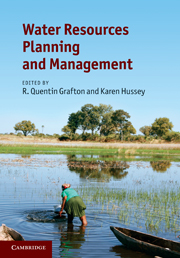Book contents
- Frontmatter
- Contents
- List of contributors
- Foreword
- Preface
- Acknowledgements
- Introduction
- Part I Understanding ‘water’
- Part II Water resources planning and management
- Part III Water resources planning and management: case studies
- III. 1 Water and waste water treatment
- 16 Overcoming water scarcity in Perth, Western Australia
- 17 Cities, agriculture and environment – sharing water in and around Hyderabad, South India
- 18 Pricing urban water services: the case of France
- 19 Collaborative flood and drought risk management in the Upper Iskar Basin, Bulgaria
- III. 2 Agricultural water use
- III. 3 Urban water supply and management
- III. 4 Aquatic ecosystems
- III. 5 Industrial and mining water use
- III. 6 Rural and remote communities
- III. 7 Water infrastructure design and operation
- III. 8 Managing water across borders
- III. 9 Market mechanisms in water management
- Contributors
- Index
- References
18 - Pricing urban water services: the case of France
from III. 1 - Water and waste water treatment
Published online by Cambridge University Press: 05 August 2011
- Frontmatter
- Contents
- List of contributors
- Foreword
- Preface
- Acknowledgements
- Introduction
- Part I Understanding ‘water’
- Part II Water resources planning and management
- Part III Water resources planning and management: case studies
- III. 1 Water and waste water treatment
- 16 Overcoming water scarcity in Perth, Western Australia
- 17 Cities, agriculture and environment – sharing water in and around Hyderabad, South India
- 18 Pricing urban water services: the case of France
- 19 Collaborative flood and drought risk management in the Upper Iskar Basin, Bulgaria
- III. 2 Agricultural water use
- III. 3 Urban water supply and management
- III. 4 Aquatic ecosystems
- III. 5 Industrial and mining water use
- III. 6 Rural and remote communities
- III. 7 Water infrastructure design and operation
- III. 8 Managing water across borders
- III. 9 Market mechanisms in water management
- Contributors
- Index
- References
Summary
Introduction: the issue of water pricing
Water providers are more and more frequently asked to charge water users the full cost of water supply services; it provides users with an incentive to use water efficiently, and it ensures the financial sustainability of the service. Setting the right tariff, however, requires not only knowledge of the cost structure of the water utilities, but also of users' water demands – otherwise decision-makers cannot anticipate, when setting a price, what impact it will have. In addition to the characteristics of domestic demand and costs of providing water services, the choice of management mode by water utilities (private versus public operation) seems to play a role on the way prices are set in this sector. France, which hosts both public and private water suppliers, provides an interesting case for analysing the relationship between the type of utility management and water prices. In this chapter, we focus on the issue of urban water pricing (leaving aside irrigation and industrial use) by describing the case of French water utilities as an illustration. We first introduce the organisation of the French water industry (Section 18.2.1) and the associated regulatory framework (Section 18.2.2). We then discuss the way water price is set (Section 18.2.3) and we summarise existing empirical results on water demand estimation using data from France (Section 18.2.4). In Section 18.3, we describe an empirical analysis of the public–private price gap for a sample of French local communities.
- Type
- Chapter
- Information
- Water Resources Planning and Management , pp. 380 - 394Publisher: Cambridge University PressPrint publication year: 2011
References
- 1
- Cited by



